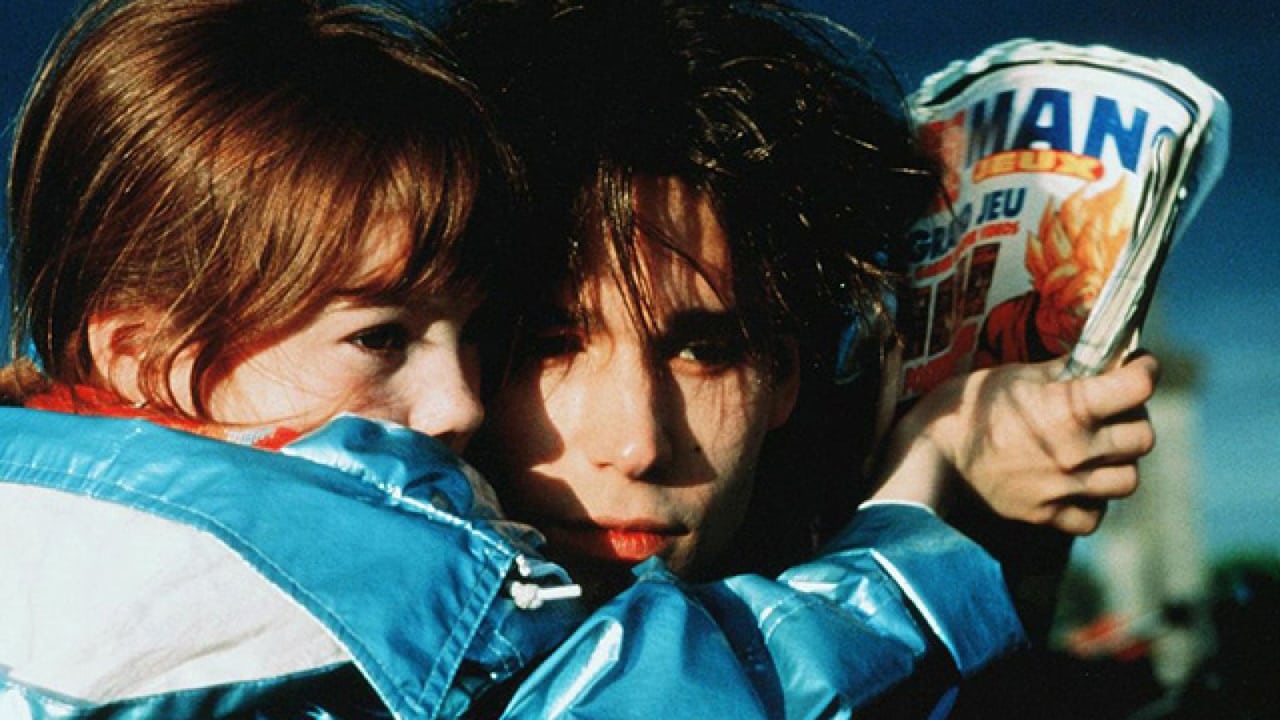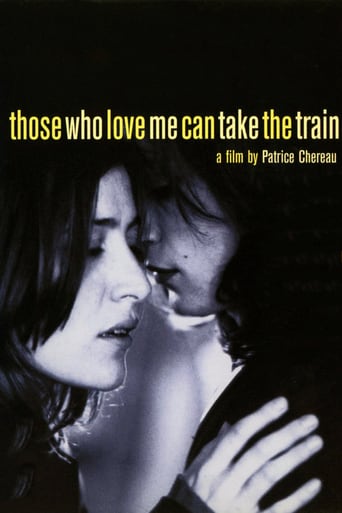

Patrice Chéreau's film "Those Who Love me Can Take the Train" will not be for everyone, a film one cannot help but describe as "an acquired taste", even if such a statement is often branded out with too much regularity. Even then, going with it will not necessarily equate to having loved it. The film, a piece about life that happens to have that of a dead body at its core, enjoys amassing characters and gathering them into the restricting, confined space of a train carriage; enjoys depicting them speak to one another; has fun tackling homosexuality and even finds time to deal with interracial falling outs within wider circles of families still. One of its final shots, a full frontal composition of a nude transvestite getting into a bath, ought to have been more striking than it was. Is this out of the fact we've spent so much time with these issue-ridden people that we've accepted this person as a human being and do not jolt? Or is it out of the fact we forget to react out of being numb through such an intense series of dialogues. Spliced into three very distinct sections, the film is about love; life; death and kinship - a film detailing the coming together of those who are apart of a wider family furthermore related to someone that has recently died. In continuing on after the burial, the film plays its hand and reveals that it was never about the gathering for the service et al. in the first place; moreover, it is a film about an apparently crumbling family and a series of exchanges between very aggressive, often confused, persons doing their best to deal with grief and being stuck with one another under these circumstances. It's here one pays special attention to the title: "Those Who Love Me Can Take the Train", a statement seemingly made beyond the grave, a line as if uttered by the deceased in relation to those travelling to his burial at one of Europe's largest cemeteries. This infers that it was never about a family coming to terms with how they felt about the deceased, but in fact with each other: many of them here do indeed 'take' the train – everybody bar one specific individual. Now that the burial's happened, let's see what they all think of each other as the piece enters its final forty minutes.Things are socially awkward at the beginning of the piece, starting out at such a stage before taking a bit of a nosedive anyhow. People meet at a station bound for the city of Limoges, where the said burial will happen for an elderly relative who made his way through life as a painter. Things are chaotic, finding everybody and getting everybody on is a struggle in itself; the train rocks around, nobody has anywhere to go – two young men find solace with each other in the toilet compartment; children are difficult to control and a woman strains to talk about her drug addiction problem. Away from the train, Roschdy Zem's character Thierry shoots down to the cemetery in his estate car, coffin in tow. He's aggressive and we're aware of what chaos he would have brought to the proceedings on board the train. He picks up hitch-hikers that have no relevance to the narrative and later allows his rage to get the better of him en route. We sense Chéreau could be producing better. They have a decent ear for dialogue and they spread the screenplay around a table consisting of either gender; various races, people from different backgrounds and of stark ages. Later on, when the family arrive at this huge graveyard, there is a neat cinematic flourish involving camera and sound working with one another in a way that doesn't happen at any other moment in what is a two hour film. Chéreau feels as if he's reigning things in, playing things down – they seem to be going out of their way to create something more neo-realistic, something that's stripped of mostly all the things synonymous with mainstream film-making (regardless of nation) and more inclined to veer into territory more associated with a brand of cinema people can find frustrating and alienating, even though there is ultimately lots going on on-screen. As stated, the approach to break the film up into distinct chapters consisting of the travelling to the burial; the process of burying said relative and then what essentially materialises as the 'wake', which is the chief point of interest here. For a film with the approach that places so much emphasis on a group of people congregating out of the fact someone in their wider family has died to carry on after the funeral itself, in spite of the triumphant aforementioned flourish once at the place we all sense will be the setting for the finale, is unsubtle at worst. I'm not sure if the film has as much energy as it thinks it does, and there are large sections of play whereby very little neither happens nor is necessarily that important. Where visually, and in terms of bare content, the film does flounder its overall thematic stands it in good stead for the long run. This is a mature film going about a serious subject matter in a fashion that screams for artistic recognition, but one that is far from perfect.
... View Moredozens and dozens of movies similar to this seem to come out of France year after year, lumberingly slow films based on the intensity of emotion without bothering to give a reason to emote with the characters in the first place. i wanted to like this movie. i watched it once baffled. watched it twice when i had some bearing on which characters were which, then watched it a third time after reading other's reviews of it to see if something was simply going over my head. In all i wasted six hours of my life on this film that makes a tedious effort at showing how powerful the emotions and soap opera shenanigans of everyday life can be, i suppose. the soundtrack for the film is worth more than the film itself. I've seen some good french cinema that managed to put some movement some effort at entertainment, this one yawned and rolled over. I suppose part of it is a bias on my behalf as I generally not entertained by (nor am i shocked or offended by) transvestitism or gay love scenes. It simply isn't my cup of tea (or glass of beer as the case maybe) About the only thing i did like about the film was something possibly suggested at that lurked underneath the plot. The idea that funerals for loved ones often serve as exercises for ego competition has struck me at the few funerals i've attended. An attitude where people compete for the position of king and queen of distraught that suggests a vanity unbecoming of true grief. A film like this could have explored that instead of using cheap tactics and pseudo-offensive ploys to gain notoriety.2 out of 10
... View MoreLet me say first of all that I'm not a train freak - but for train freaks, the shots on board the train were well done, there was a good sense of movement all through. Even after the funeral - and no trains, this was sustained.I was amused at Jean-Baptiste's desire for everyone who loved him to go by train, but his coffin to be transported by car - and did have to ask if those who came to the funeral by car did it from lack of love for the dear departed or from geographical necessity? I enjoyed this film more than I expected to; it was well paced, the characters were compelling, if not exactly your average circle of family and friends.The standard of acting was generally very good - I particularly enjoyed Vincent Perez's performance.If it reminded me of anything, the use of a widely varied soundtrack put me in mind of some of Fassbinder's better work.I feel this film justifies watching more than once, if only to sort out who's who and where they fit together, but, from first viewing, plenty of life, despite being based round a death.
... View MoreIf you like dense, complex character studies, this is one for you. Patrice Chéreau is not interested in pat solutions, 'pop-corn' plots, spoon-fed comedy or 'star' vehicles.A gaggle of friends and relations pile onto a train from Paris to Limoges, enroute to a funeral. The deceased has had an impact on each character, and as they bicker, laugh, grieve and confide in each other, a picture of the dead man is fleshed out.Chéreau has cast this work superbly, creating a hyper-realistic ensemble. He allows his cast to create an almost improvised quality, dialogue crossing over dialogue, with each performer whether major and minor bringing utter conviction and truth to their role. At no time to you feel manipulated to either love or loathe any of the characters.The conclusion is perhaps a little lacking, but that's only because I didn't really want to leave the throng.Don't expect Hollywood-style comedy, drama or action. Instead, settle down and relish the thoughtful and intelligent craft of this French genius!
... View More